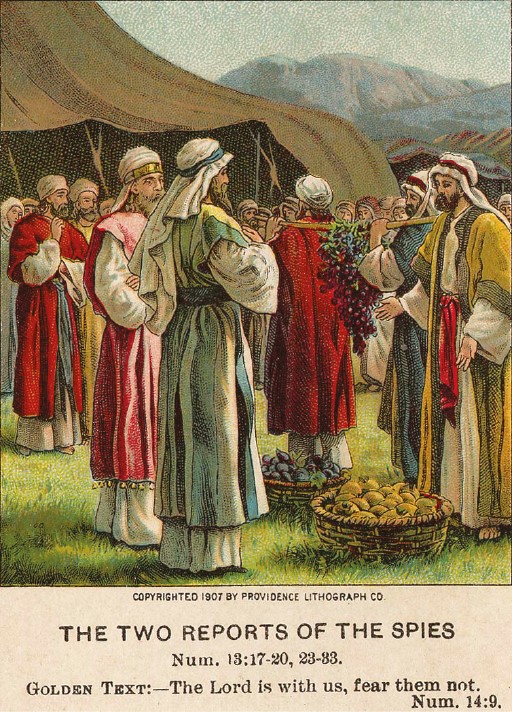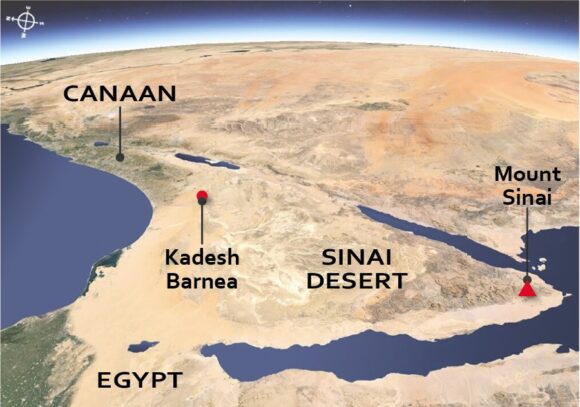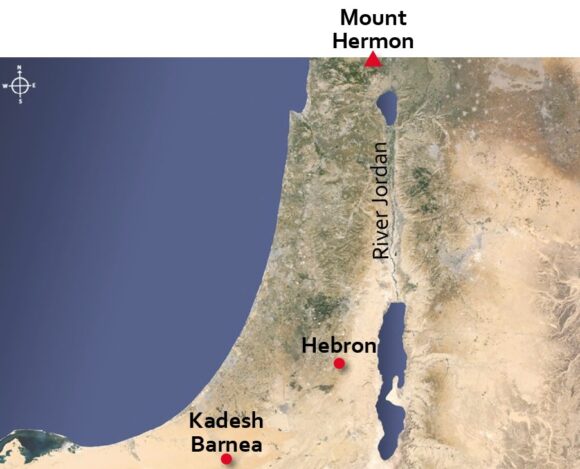BY THE COASTAL ROAD, the distance from the border of Egypt to the frontier of Israel is under 200 miles. At a modest pace of 10 miles a day, it could be walked in three weeks. But the journey to the Promised Land took the people of Israel over 40 years. The reason for this extraordinary delay is at once depressing and instructive. This is how it came about.
Some time after they received the Law from God at Mount Sinai, the Israelites set off northwards through the Sinai Peninsula. They arrived eventually at Kadesh Barnea, an oasis in the desert not far from the boundary of Canaan. After a Iifetime of burden-bearing in Egypt, the people were looking forward to the farms and villages they had been promised. The snag was, they had no experience of warfare, and the Canaanites were likely to resist bitterly any attempts to evict them.
Reconnaissance
After some discussion, the leaders gathered together to Moses. They suggested he should send out a party of scouts to survey the country, make notes of the disposition of the enemy cities and forces, and return with a full report. God endorsed the plan, and Moses set up a twelve-man group, with a top-level representative from each tribe. ‘See what the land is’, he instructed them, ‘and whether the people who dwell in it are strong or weak, whether they are few or many, and whether the land that they dwell in is good or bad’ (Numbers 13:18–19).
For six weeks the people camped patiently at Kadesh, waiting for the spies to come back. The reconnaissance party headed up the coastal plain to the extreme north of the country near Mount Hermon. They then swung down through the central highlands to Hebron, the burial place of their ancestor Abraham. From an unsuspecting Canaanite farmstead they helped themselves to figs, pomegranates and grapes, to bring back as samples of the produce you could grow there. It included a single bunch of grapes so heavy that two men had to carry it on a pole slung between them. Weary and full of their adventure, they returned to Kadesh, where the people gathered excitedly round to hear what they had to say.
In those days, the land of Canaan was extremely fertile. Thick forests covered the hills which formed the backbone of the country. Traces of these survive today only in Galilee. Westwards towards the Mediterranean Sea the sloping plains grew golden corn. Terraces of vines clothed the hillsides, and northwards in the well- watered area of Galilee were figs, olives and pomegranates. Only to the south, beyond the prairies of the Negev, lay the hostile deserts of the triangular Sinai Peninsula. Palestine is a country of contrasts. The western sea coast has a typical Mediterranean climate, but the hilly interior is cool in winter, with occasional snow. The Jordan valley to the east drops rapidly below sea level to a giant rift, green with steamy jungle. To the north, the majestic snow-covered Mount Hermon rises to 2750 metres (9000 feet), towering above the foothills of Lebanon.
The whole country is so small you can span north to south, or east to west, in a few hours’ driving, revelling in its beauty. In those times, before the centuries of neglect it has suffered, it was indeed ‘a land of wheat and barley, of vines and fig trees and pomegranates, a land of olive trees and honey’ (Deuteronomy 8:8).
A Bad Report
When the scouts reported back, the tribes were impressed with their mouth-watering descriptions. Their doubts came when the spies reviewed the military strength of the Canaanites. Strong, walled cities abounded in which the inhabitants could take refuge. ‘The people who dwell in the land are strong’, they declared. ‘All the people that we saw in it are of great height’ (Numbers 13:28, 32). So difficult did they rate the task of conquering the land, that the hearts of the Israelites sank. Wild rumours spread through the camp. Next morning a vast, noisy concourse gathered round Moses’ headquarters. Bitterly they reproached him for his folly in attempting an impossible task. ‘Would that we had died in this wilderness!’ they moaned. ‘Our wives and our little ones will become a prey. Would it not be better for us to go back to Egypt?’ (Numbers 14:2–3).
In this emergency two of the scouts, Joshua and Caleb, stood up for Moses.
They pointed out, very reasonably, that God was their secret weapon against the Canaanites. He had not let them down so far. He had delivered them from the great army of Pharaoh.
There was no reason to fear, they said. But the other ten spies gave their opinion that the Canaanites were too strong for them, and Joshua and Caleb were shouted down.
It was an ugly situation. At that moment, a burning fire shone out from the Tabernacle, and the angel of the Lord summoned Moses to his presence. ‘How long will this people despise me?’ came the message. ‘And how long will they not believe in me, in spite of all the signs that I have done among them?’ (v. 11). God was very angry.
Crisis of Faith
How would you have voted, standing in that crowd before Moses’ tent? Would you have had the faith to believe that God really could conquer all your enemies?
We frequently hear people saying they would Iike to believe in God, but they need more evidence. Depressingly, those Israelites had seen tremendous miracles, yet they still lacked the faith they needed to see them through the crisis. It was the same in Jesus’ day. ‘ Though he had done so many signs before them’, the apostle John concluded, ‘ they still did not believe in him’ (John 12:37). Seeing is not always believing.
There are plenty of signs today that God is active in the world, should we want to have faith. The return of the Jews to their land, the gathering political storm in the Middle East, the discoveries of archaeologists in Bible lands, all confirm what the Bible has been saying all along. The problem lies in our hard, self-centred human hearts. ‘Do not harden your hearts’, pleaded David the Psalmist, ‘as at Meribah, as on the day at Massah in the wilderness, when your fathers put me to the test and put me to the proof, though they had seen my work’ (Psalm 95:8–9). David wrote hundreds of years after the Exodus, yet he warned his generation that they could make the same mistake as their forefathers. The New Testament Letter to the Hebrews quotes David’s psalm, with the same warning a thousand years later (Hebrews 4:11). Faith is not an instant response to a miracle. It starts in a pliable, humble heart. It grows from reading God’s word and learning about His faithfulness, mercy and love. It is perfected by experience of His unseen hand. It ends as a dynamic conviction that God Iives, that He cares about our Iives, and that He can carry us safely to His Kingdom.
What happened to those rebels in the wilderness? God’s patience had expired. ‘Your Iittle ones, who you said would become a prey, I will bring in,’ He said, ‘and they shall know the land that you have rejected. But as for you, your dead bodies shall fall in this wilderness’ (Numbers 14:31–32). For the next 40 years the Israelites Iived as nomads in tents, until the grown men who left Egypt had died out. Their children survived.
Two Faithful Men
There were exceptions. Joshua and Caleb, the brave spies who opposed the majority and defended the honour of God, crossed the River Jordan and were given an inheritance in the Promised Land. It had been the journey of a Iifetime for them, but their faith was rewarded.
They came back to the country they had visited as spies 40 years before, and were allowed to take their choice of a place to settle. Remarkably, while Joshua was a full-born Jew, it seems Iikely that Caleb was not. His full title is ‘Caleb the son of Jephunneh the Kenizzite’ (Numbers 32:12). The Kenizzites were a tribe inhabiting the land of Canaan before the time of Abraham (Genesis 15:19). Possibly Caleb’s father had married into the house of Israel and become an adopted Israelite. His name, in Hebrew, means ‘a dog’—an expression Jews used to describe a Gentile (non-Jew).
If this deduction is correct, we have a wonderful lesson from the faith of these two men. Joshua the Jew and Caleb the Gentile both believed in God and both received the promise. It is an early illustration of the principle that God is not concerned with race, or sex, or status, but with our hearts. ‘The scripture,’ writes Paul, ‘foreseeing that God would justify the Gentiles by faith, preached the gospel beforehand to Abraham, saying, “In you shall all the nations be blessed.” So then, those who are of faith are blessed along with Abraham, the man of faith’ (Galatians 3:8–9).
David M Pearce
“Take care, brothers, lest there be in any of you an evil, unbelieving heart, leading you to fall away from the living God… For who were those who heard and yet rebelled? Was it not all those who left Egypt led by Moses? And with whom was he provoked for forty years? Was it not with those who sinned, whose bodies fell in the wilderness? And to whom did he swear that they would not enter his rest, but to those who were dis- obedient? So we see that they were unable to enter because of unbelief.” Hebrews 3:12–19




